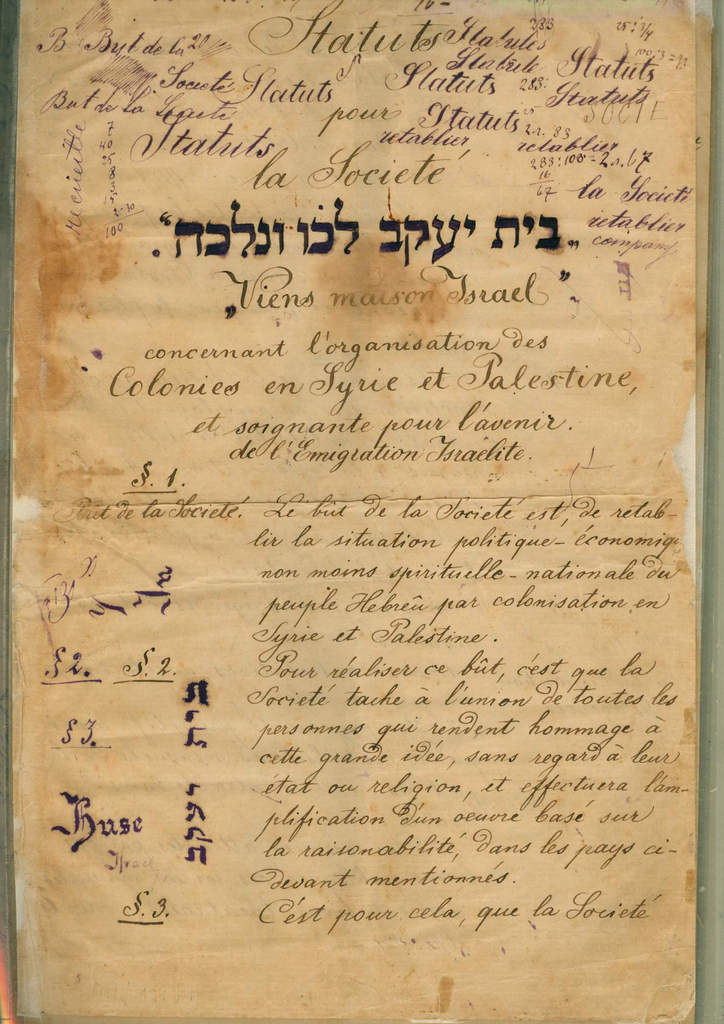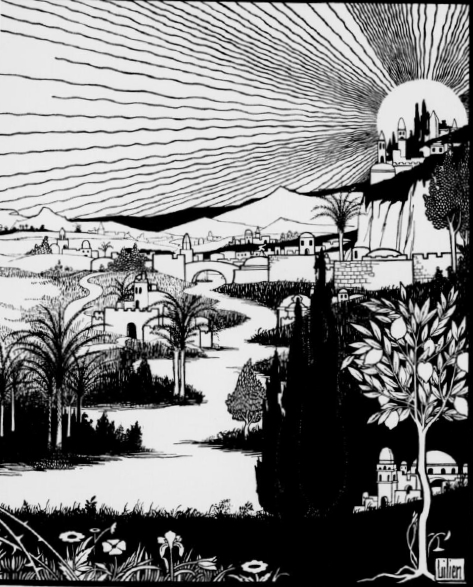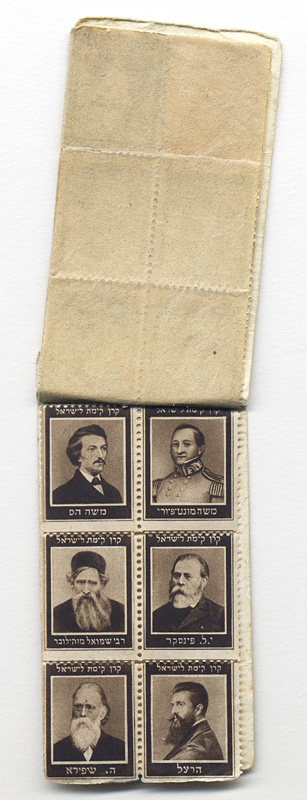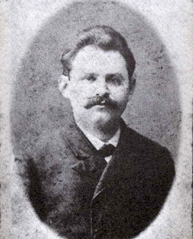|
Bilu (movement)
Bilu (; also Palestine Pioneers) was a Jewish movement of the late 19th century, fueled predominantly by the immigration of Russian Jews, whose goal was the agricultural settlement of the Land of Israel. Its members were known as Bilu'im, and the movement sought to inspire Jews to migrate to Ottoman Palestine. The Bilu'im rejected progressive notions such as Emancipation and assimilation as viable options for Jewish survival. The movement collapsed as a result of the challenging farming conditions in Palestine and a lack of funding to sustain the settlers. Etymology Originally the movement was called Davio, an acronym of the Hebrew words from the Book of Exodus: "Speak unto the children of Israel that they will go forward." The movement's name was later changed by its founder, Israel Belkind, to "Bilu", which is an acronym based on a Verse (bible), verse from the Book of Isaiah (Isaiah 2:5, 2:5) "בית יעקב לכו ונלכה" Beit Ya'akov Lekhu Venelkha ("House of Jacob, l ... [...More Info...] [...Related Items...] OR: [Wikipedia] [Google] [Baidu] |
Pale Of Settlement
The Pale of Settlement was a western region of the Russian Empire with varying borders that existed from 1791 to 1917 (''de facto'' until 1915) in which permanent settlement by Jews was allowed and beyond which the creation of new Jewish settlements, permanent or temporary, was mostly forbidden. Jews were allowed to live outside the area, including those with university education, the ennobled, members of the most affluent of the merchant guilds and particular artisans, some military personnel and some services associated with them, including their families, and sometimes their servants. Pale is an archaic term meaning an enclosed area. Jews were also allowed to settle in colonies outside of the Pale, such as in Siberia. The Pale of Settlement included all of modern-day Belarus and Moldova, much of Lithuania, Ukraine and east-central Poland, and relatively small parts of Latvia and what is now the western Russian Federation. It extended from the eastern ''pale'', or demarcation ... [...More Info...] [...Related Items...] OR: [Wikipedia] [Google] [Baidu] |
Edmond James De Rothschild
Baron Abraham Edmond Benjamin James de Rothschild (; 19 August 1845 – 2 November 1934) was a French member of the Rothschild banking family. A strong supporter of Jewish settlement in Palestine, his large donations lent significant support to the First Aliyah, which helped lead to the establishment of the State of Israelwhere he is simply known as "The Baron Rothschild", "HaBaron" (), or "Hanadiv Hayeduah" (). Early years A member of the French branch of the Rothschild banking dynasty, he was born in the Paris suburb of Boulogne-Billancourt, Hauts-de-Seine, the youngest child of James Mayer Rothschild and Betty von Rothschild. He grew up in the world of the Second Republic and the Second Empire and was a soldier " Garde Mobile" in the Franco-Prussian War. In 1877, he married Adelheid von Rothschild of Naples, the daughter of Wilhelm Carl von Rothschild, one of the Rothschild banking family of Naples, with whom he had three children: James Armand Edmond, Maurice Edm ... [...More Info...] [...Related Items...] OR: [Wikipedia] [Google] [Baidu] |
Cooperative
A cooperative (also known as co-operative, coöperative, co-op, or coop) is "an autonomy, autonomous association of persons united voluntarily to meet their common economic, social and cultural needs and aspirations through a jointly owned and democratically-controlled wikt:Enterprise, enterprise". Cooperatives are democratically controlled by their members, with each member having one vote in electing the board of directors. They differ from Collective farming, collectives in that they are generally built from the bottom-up, rather than the top-down. Cooperatives may include: * Worker cooperatives: businesses owned and managed by the people who work there * Consumer cooperatives: businesses owned and managed by the people who consume goods and/or services provided by the cooperative * Producer cooperatives: businesses where producers pool their output for their common benefit ** e.g. Agricultural cooperatives * Purchasing cooperatives where members pool their purchasing power ... [...More Info...] [...Related Items...] OR: [Wikipedia] [Google] [Baidu] |
Zion
Zion (; ) is a placename in the Tanakh, often used as a synonym for Jerusalem as well as for the Land of Israel as a whole. The name is found in 2 Samuel (), one of the books of the Tanakh dated to approximately the mid-6th century BCE. It originally referred to a specific hill in Jerusalem, Mount Zion, located to the south of Mount Moriah (the Temple Mount). According to the narrative of 2 Samuel 5, Mount Zion held the Jebusite fortress of the same name that was conquered by David and was renamed the City of David. That specific hill ("mount") is one of the many squat hills that form Jerusalem. The term ''Tzion'' came to designate the area of Davidic Jerusalem where the Jebusite fortress stood, and was used as well as synecdoche for the entire city of Jerusalem; and later, when Solomon's Temple was built on the adjacent Mount Moriah (which, as a result, came to be known as the Temple Mount), the meanings of the term ''Tzion'' were further extended by synecdoche to the ad ... [...More Info...] [...Related Items...] OR: [Wikipedia] [Google] [Baidu] |
Rishon LeZion
Rishon LeZion ( , "First to Zion") is a city in Israel, located along the central Israeli coastal plain south of Tel Aviv. It is part of the Gush Dan metropolitan area. Founded in 1882 by Jewish immigrants from the Russian Empire who were part of the First Aliyah, it was the first settlement founded in Israel by the New Yishuv and the second Jewish farm settlement established in Ottoman Syria in the 19th century, after Petah Tikva. As of 2017, it was the fourth-largest city in Israel, with a population of . The city is a member of Forum 15, which is an association of fiscally autonomous cities in Israel that do not depend on national balancing or development grants. Etymology The name Rishon LeZion is derived from a verse from the Tanakh: "First to Zion are they, and I shall give herald to Jerusalem" ( Isaiah 41:27) and literally translates as "First to Zion". History Ottoman period (1882–1900) Rishon LeZion was founded on 31 July 1882, by ten Hovevei Zion pione ... [...More Info...] [...Related Items...] OR: [Wikipedia] [Google] [Baidu] |
Leon Pinsker
Leon Pinsker or Judah Leib Pinsker (; ; – ) was a physician and Zionist activist. Earlier in life he had originally supported the cultural assimilation of Jews in the Russian Empire. He was born in the town of Tomaszów Lubelski in the southeastern border region of the Kingdom of Poland, and educated in Odessa, where he studied law but was unable to practice because of restrictions on occupations available to Jews. Pinsker was a supporter of equal rights under the law for Jews, but his optimism was curtailed after the Odessa Pogroms. In response to the pogroms of 1871 and 1881, Pinsker founded the Zionist organization Hibbat Zion in 1881. Political disagreements between religious and secular factions of the Odessa Committee, and Ottoman restriction on Jewish emigration, prevented Pinsker from resettling, and he died in Odessa in 1891. His remains were brought to Jerusalem in 1934. Biography Leon (Yehudah Leib) Pinsker inherited a strong sense of Jewish identity from his ... [...More Info...] [...Related Items...] OR: [Wikipedia] [Google] [Baidu] |
Hovevei Zion
The Lovers of Zion, also ''Hovevei Zion'' () or ''Hibbat Zion'' (, ), were a variety of proto-Zionist organizations founded in 1881 in response to the anti-Jewish pogroms in the Russian Empire and were officially constituted as a group at a conference led by Leon Pinsker in 1884. The organizations are now considered the forerunners and foundation-builders of modern Zionism. Many of the first groups were established in Eastern European countries in the early 1880s with the aim to promote Jewish immigration to Palestine, and advance Jewish settlement there, particularly agricultural. Most of them stayed away from politics. History 19th century Palestine was inhabited by Muslims, Armenians, Christians, and Jews. As early as 1840 Moses Montefiore advocated for the Jews in the Ottoman Empire, which controlled the areas of Palestine, meeting with British consul Henry John Temple, 3rd Viscount Palmerston to get Muhammad Ali of Egypt and Abdülmecid I, sultan of the Ottoman Empir ... [...More Info...] [...Related Items...] OR: [Wikipedia] [Google] [Baidu] |
Old Yishuv
The Old Yishuv (, ''haYishuv haYashan'') were the Jewish communities of the Land of Israel during the Ottoman period, up to the onset of Zionist aliyah waves, and the consolidation of the new Yishuv by the end of World War I. Unlike the new Yishuv, characterized by secular and Zionist ideologies promoting labor and self-sufficiency, the Old Yishuv primarily consisted of religious Jews who relied on external donations ('' halukka'') for support. The Old Yishuv evolved following a significant decline in Jewish communities across the region during late antiquity and the early Middle Ages, and was composed of three clusters. Firstly, Ladino-speaking Sephardic Jewish communities settled in the region during the late Mamluk and early Ottoman periods, alongside Arabic-speaking ''Musta'arabi'' communities, who had already been living there since before the coming of Islam and had been culturally and linguistically Arabized. Secondly, Ashkenazi Jews emigrated from Europe in the 18th ... [...More Info...] [...Related Items...] OR: [Wikipedia] [Google] [Baidu] |
Mikveh Israel
Mikveh Israel () is a youth village and boarding school in the Tel Aviv District of central Israel, established in 1870. It was the first Jewish agricultural school in what is now Israel and indeed the first modern Jewish settlement in Palestine under the Ottoman Empire rule outside of Jerusalem, heralding a new era in the history of the region. In it had a population of . History Mikveh Israel was founded in the Mutasarrifate of Jerusalem, Ottoman Empire in April 1870 by Charles Netter, an emissary of the French organization Alliance Israélite Universelle, aiming to be an educational institution where young Jews could learn agriculture and leave to establish villages and settlements all over the country and to make the desert blossom. It was established on a tract of land southeast of Jaffa leased from the Ottoman Sultan, who allocated to the project. [...More Info...] [...Related Items...] OR: [Wikipedia] [Google] [Baidu] |
Ashkenazi Jews
Ashkenazi Jews ( ; also known as Ashkenazic Jews or Ashkenazim) form a distinct subgroup of the Jewish diaspora, that emerged in the Holy Roman Empire around the end of the first millennium CE. They traditionally speak Yiddish, a language that originated in the 9th century, and largely migrated towards northern and eastern Europe during the late Middle Ages due to persecution. Hebrew was primarily used as a literary and sacred language until its 20th-century revival as a common language in Israel. Ashkenazim adapted their traditions to Europe and underwent a transformation in their interpretation of Judaism. In the late 18th and 19th centuries, Jews who remained in or returned to historical German lands experienced a cultural reorientation. Under the influence of the Haskalah and the struggle for emancipation, as well as the intellectual and cultural ferment in urban centres, some gradually abandoned Yiddish in favor of German and developed new forms of Jewish relig ... [...More Info...] [...Related Items...] OR: [Wikipedia] [Google] [Baidu] |
Sephardim
Sephardic Jews, also known as Sephardi Jews or Sephardim, and rarely as Iberian Peninsular Jews, are a Jewish diaspora population associated with the historic Jewish communities of the Iberian Peninsula (Spain and Portugal) and their descendants. The term "Sephardic" comes from '' Sepharad'', the Hebrew word for Iberia. These communities flourished for centuries in Iberia until they were expelled in the late 15th century. Over time, "Sephardic" has also come to refer more broadly to Jews, particularly in the Middle East and North Africa, who adopted Sephardic religious customs and legal traditions, often due to the influence of exiles. In some cases, Ashkenazi Jews who settled in Sephardic communities and adopted their liturgy are also included under this term. Today, Sephardic Jews form a major component of world Jewry, with the largest population living in Israel. The earliest documented Jewish presence in the Iberian Peninsula dates to the Roman period, beginning in the fi ... [...More Info...] [...Related Items...] OR: [Wikipedia] [Google] [Baidu] |








